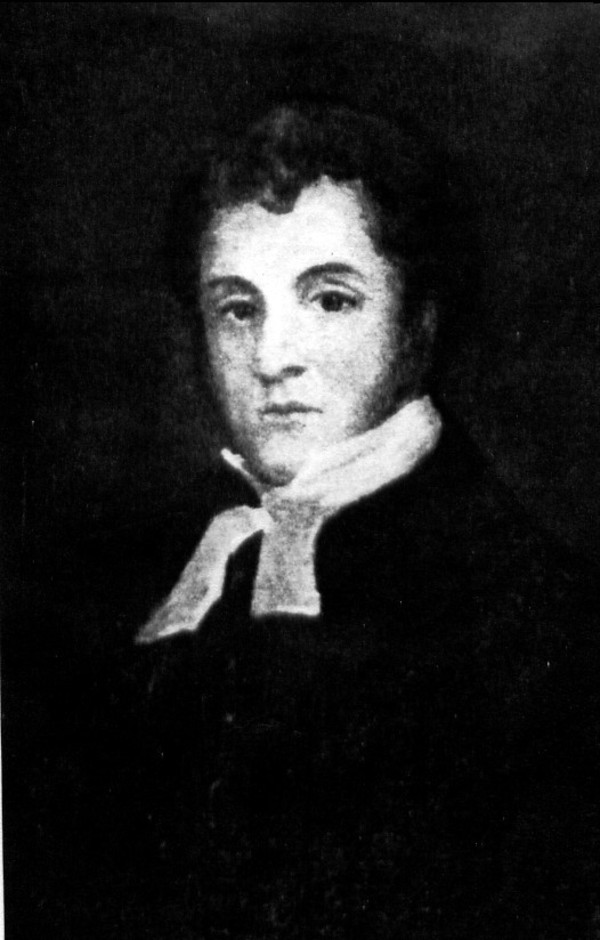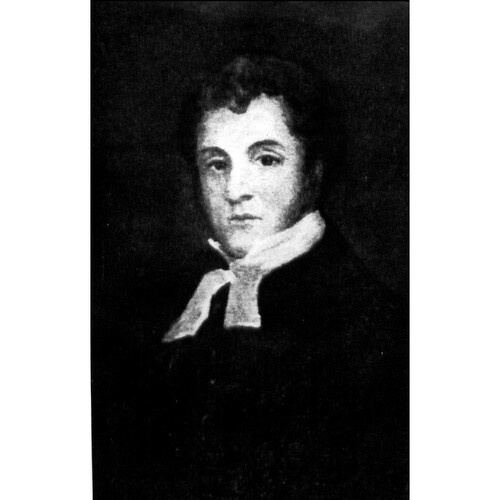
Source: Link
STEVENS, BROOKE BRIDGES, Church of England clergyman and journalist; baptized 3 Aug. 1787 in Quorndon, Leicestershire, England, son of the Reverend Thomas Stevens and Sarah –; m. 4 Sept. 1820 Elizabeth Nelles in Grimsby, Upper Canada, and they had six children, of whom two died in infancy; d. 13 May 1834 in Montreal and was buried 16 May in Lachine, Lower Canada.
Brooke Bridges Stevens was tutored by his father, who was rector of Panfield and Whitehall preacher to the king. Shortly after his father’s death in 1809, Stevens entered the University of Cambridge, where he won two prizes for declamation and in 1813 obtained his ba. In the latter year he was made deacon by the bishop of Chester and served at Great Coggeshall as assistant to the Reverend Richard Mant, whom he soon succeeded. He was ordained a priest in 1814 by the bishop of London. The following year he resigned his parish on being appointed chaplain to the British forces in France under the command of the Duke of Wellington. In 1817 he received his ma from Cambridge and published A series of discourses on the festivals and fasts . . . of the Church of England.
In 1819 Stevens was ordered to Lower Canada. He arrived in July carrying a letter from the chaplain general to the Duke of Richmond [Lennox*] attesting to his respectability and to his having served “with the highest credit to himself.” In the course of a short initial stay in Montreal, he visited the garrison at Chambly, where he organized many of the town’s residents into a congregation and helped launch construction of a church, later named St Stephen’s. For his initiative he received the first of several commendations from Bishop Jacob Mountain.
In 1820 Stevens was removed to Fort George (Niagara-on-the-Lake, Ont.). Besides exercising his duties as military chaplain there, he visited the surrounding area and encouraged the building of a small church at Queenston. On Mountain’s recommendation, the Society for the Propagation of the Gospel accorded him a salary of £50 for his missionary services. In 1821 he was transferred back to Montreal, where on 23 June the Montreal Herald announced the imminent arrival of the man “with whose preaching the congregation of the Protestant Episcopal Church were so pleased during his short stay in this city.”
Stevens soon became heavily involved in the religious life of Montreal and nearby districts. By 1823 he was performing his duties as garrison chaplain to the “great satisfaction” of the commanding officer and assisting the rector of Montreal, John Bethune*, to the extent that Mountain recommended again that he receive a salary of £50 from the SPG. In addition, he was organizing a congregation, named St Stephen’s, at Lachine, serving in Montreal and Lachine as visitor to schools associated with the Royal Institution for the Advancement of Learning, of which another Anglican priest, Joseph Langley Mills, was the secretary, and nurturing into existence a small school at Île-aux-Noix. At the same time he was making a name for himself as an eloquent and popular preacher through his evening lectures at Christ Church.
The scope of Stevens’s activities continued to broaden. By 1824 he was grand chaplain to the recently formed United Masonic Lodge of Montreal and William Henry, deeply involved as librarian and secretary in the activities of the Montreal district committee of the Society for Promoting Christian Knowledge, and secretary to the committee of management of the large National School in Montreal, which was financed from Royal Institution funds. His involvement with schools of the Royal Institution became increasingly onerous as opposition to them from other denominations persisted, difficulties with teachers and shortages of funds developed, and competing schools came into existence. One of the most regular visitors to the schools, he also contributed substantial sums to their maintenance until, as he wrote to Mills in 1826, “common Prudence calls out, hold hard, and pull up!” He did not take his own advice.
As early as 1822 Bethune had raised with Stevens the possibility of editing a church magazine. This idea matured in 1827 when the office of editor of the Christian Sentinel and Anglo-Canadian Churchman’s Magazine was, as he later put it, forced upon him “with gentle violence.” During the year six numbers, one every second month, were issued under his editorship. The objectives of the magazine were to circulate “the genuine principles of the Catholic Church of Christ” and especially “to defend the Apostolic Constitution, Orthodox Doctrines, and Scriptural Ritual of the national Church of England.” Stevens’s approach – “never to act on the offensive, but, like a good sentinel, to defend one’s own post, and to watch with vigilance the motions of an enemy from whatever quarter” – reflected the defensive attitude of the colonial church, whose claims to privileged status as the established church were being increasingly contested by Presbyterians, Methodists, and Roman Catholics. Providing an unofficial diocesan chronicle, Stevens’s paper contained reports from religious societies, book reviews, ecclesiastical appointments, news of the colonial church, and biographies of important clergy. The experience of editorship was not a happy one for Stevens; at the end of 1827 he penned a “Valedictory Address” announcing his resignation because of fluctuating health and uneasiness about having found himself “surrounded by a host of censors and counsellors, whilst fellow labourers and supporters were rare and lukewarm.” Bethune, as acting editor, and after him Samuel Simpson Wood* brought out nine more issues before the magazine folded in June 1829.
That year the additional responsibility of acting senior chaplain to the forces in the Canadas devolved upon Stevens when Joseph Langley Mills went to England. Stevens was obliged to handle all administrative tasks without assistance other than that he already had as chaplain at Montreal, and as part of his new work he was ordered in 1830 to carry out a tour of Upper Canada. Dissatisfaction with his situation was aggravated in May 1831 when, despite his objections, a change was made in the hour of divine service for the troops at Montreal, rendering more difficult his fulfilment of other duties. His mood was further darkened by cuts in financial support for the school at Lachine and deteriorating relations with Bethune, who undoubtedly felt the pressure of Stevens’s eloquence and popularity and who had opposed him over the hour of divine service for the troops. To cap Stevens’s frustrations, early in 1832 he received news that the office of chaplain at Montreal was to be discontinued and he himself put on half pay. He decided to present his case in England, and in July 1832 he left with the effusive good wishes of many groups in Montreal and Lachine ringing in his ears.
By late 1833, to the consternation of a few and the joy of many, Stevens was back in Montreal, restored to his duties as chaplain and to the position of evening lecturer, which he had resigned in England. A dismayed Bethune suggested to Archdeacon George Jehoshaphat Mountain* that Stevens’s appointments be cancelled, adding: “The friends of horse racing, Theatres &c. (who are a majority) will prefer Stevens to any one who feels himself obliged to raise his voice against such things.” But Bethune’s discomfiture was short-lived. On his return, it was clear to his friends that Stevens was in declining health, and the resumption of his duties led to his death only eight months later. He was buried, according to his wish, in St Stephen’s Church, Lachine. Admired and respected by those of other religions persuasions, Stevens was a compassionate and articulate priest, who gave himself to his vocation without reserve.
Brooke Bridges Stevens is the author of A series of discourses on the festivals and fasts (and other peculiar days) of the Church of England . . . (London, 1817) and of A masonic discourse delivered at the installation of the Hon. William McGillivray, as R.W.P.C.M. of the united districts of Montreal and William-Henry, Lower Canada (Montreal, 1824). He was also editor of the Christian Sentinel and Anglo-Canadian Churchman’s Magazine (Montreal) in 1827. A portrait of Stevens has been reproduced in F. D. Adams, A history of Christ Church Cathedral, Montreal (Montreal, 1941), and another in George Merchant, The history. of St. Stephen’s Anglican Church, Lachine, Quebec, Canada, 1822–1956 (rev. ed., n.p., [1956]).
ACC, Diocese of Montreal Arch. (Montreal), G. J. Mountain papers; B. B. Stevens papers. ACC-Q, 103–5, 129, 314, 348. ANQ-M, CE1-65, 1821–34; CM1-2/4, 13 mai 1834; 1/17–18. McGill Univ. Arch., Royal Instit. for the Advancement of Learning, incoming corr., 1820–34. PAC, RG 8,I (C ser.), 65: 28B, 32B, 104–5, 170; 67: 139, 169–70,194–96,202–5,226–52; 68:2–4,18–19,122–23, 152–63. USPG, C/CAN/folder 480; C/CAN/Que., 1, no.17; Journal of SPG, 20: 391–93; 21: 384–88. “Early records of St. Mark’s and St. Andrew’s churches, Niagara,” comp. Janet Carnochan, OH, 3 (1901): 79. “Masonic installation,” Canadian Magazine and Literary Repository (Montreal), 1 (July–December 1823): 375. Montreal Gazette, 21–22 Oct. 1833; 13, 17 May 1834. Montreal Herald, 23 June 1821, 16 Oct. 1824, 16 Aug. 1826, 15 May 1834. Quebec Gazette, 19 July 1819. Quebec Mercury, 12 June 1832. Beaulieu et Hamelin, La presse québécoise, 1: 59. Millman, Jacob Mountain, 230, 248; The life of the Right Reverend, the Honourable Charles James Stewart, D.D., Oxon., second Anglican bishop of Quebec (London, Ont., 1953), 47, 68–69, 143, 219.
Cite This Article
J. P. Francis, “STEVENS, BROOKE BRIDGES,” in Dictionary of Canadian Biography, vol. 6, University of Toronto/Université Laval, 2003–, accessed December 31, 2025, https://www.biographi.ca/en/bio/stevens_brooke_bridges_6E.html.
The citation above shows the format for footnotes and endnotes according to the Chicago manual of style (16th edition). Information to be used in other citation formats:
| Permalink: | https://www.biographi.ca/en/bio/stevens_brooke_bridges_6E.html |
| Author of Article: | J. P. Francis |
| Title of Article: | STEVENS, BROOKE BRIDGES |
| Publication Name: | Dictionary of Canadian Biography, vol. 6 |
| Publisher: | University of Toronto/Université Laval |
| Year of publication: | 1987 |
| Year of revision: | 1987 |
| Access Date: | December 31, 2025 |



